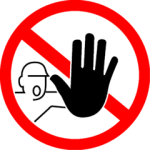As was discussed in part 0, Free Software is about your freedom, not the price of the software.
Most of us use Propitiatory (non-free) Software, on our computers. This software sometimes has zero price, but always we have to do what we are told, and we do not know and can not know what is happening in our computer.
 If a student asks “How does this work?”, then we have to say “I can not tell you, it is illegal to look.”
If a student asks “How does this work?”, then we have to say “I can not tell you, it is illegal to look.”
If you have some software, and I say “That is nice, can I have a copy?”, then you have to decide, whether to betray our friendship or to betray you agreement with the software vendor. Both are bad, what should you do?

If you have multiple computers, and you install the same software in more than one computer then you are a criminal.
There may be back doors in the security, there is no way to know.
If you find a bug or wish to add a new feature (or ask a friend/company to), then you can not.
 We are told that if you make copies, to help a friend, or to put on all your family’s computers. Then you are a criminal.
We are told that if you make copies, to help a friend, or to put on all your family’s computers. Then you are a criminal.
We are told that if you help others with fixes, then you are a bad person.
(These may not be a criminal offences, but we are told in marketing campaigns that they are).
There is a crises in education. Teachers try to teach children what they already know about computer. At graduation they only know how to use the products they are taught (or used at home); They are trained to be consumers of software. The software producers meanwhile can to hire school/university leavers to write new software at they are no longer of high enough quality; They have no experience, or knowledge of how the computer/software works.
Software producers may give away software to students. If a student is trained to use a product, then when they graduate, they or there company must pay. Students should be educated not trained.
Poorer people can not afford the software. Software provider keep the prices as high as possible. People in 3rd world countries have to pay more than is fair.
Defective by design
Proprietary software is often intentionally limited, depending on which version you have and how much you paid. Often you will see only the top of the range version in the advertisements.
Sometimes the amount of memory that is usable is limited, adding more will have no effect. Here is a comparison of some of the many MS-Windows versions, Gnu/Linux and my laptop. As you can see there is not much choice if I want to use all of my memory in 32-bit mode.
| Operating system. |
Maximum Ram |
| 32 bit |
64 bit |
| Windows 7 Starter. |
2 GB |
N/A |
| Windows 7 Home Basic. |
4 GB |
8 GB |
| Windows 7 Home Premium. |
4 GB |
16 GB |
| Windows 7 Professional, Enterprise, Ultimate. |
4 GB |
192 GB |
| Windows Server 2008 R2 Foundation. |
N/A |
8 GB |
| Windows Server 2008 Webserver. |
4 GB |
32 GB |
| Windows Server 2008 Enterprise. |
64 GB |
2048 GB |
| Gnu/Linux Desktop or Server. (Free Software) |
64 GB |
2048 GB |
| My cheep 2½ year old laptop. (Hardware) |
8 GB |
8 GB |
To get more than about 3GB on any operating system, in 32 bit mode, you need to enable Physical Address Extensions (PAE). Both PAE and 64bit mode will break some drivers in MS-Windows. Because of freedoms 1 and 3, it was possible to fix all the device drivers in Gnu/Linux, so this is not a problem for this operating system.
The numbers for MS-Windows 7 is from Microsoft’s website. However I could not get more that about 3GB working on a work laptop with 4GB and windows Professional (even with PAE enabled). The same machine with Gnu/Linux used all 4GB. (This is not using the environment sparingly, the computer has 33⅓% more memory that is used.)
Microsoft also puts speed limitations, other resource limitations and also removes/disables features, in various version of there software. With Free Software if it has a feature then it has a feature.
This taken from pcworld advert for MS-Windows 7 Ultimate. I have highlighted some of the features you don’t get in lesser versions of MS-Windows 7. Note Gnu/Linux has all this except a gratis copy of XP, though you are free to run this non-free operating system in a virtual machine:
Microsoft Windows 7 Ultimate offers all the exciting improvements of Home Premium and Professional, plus added security features and the ability to work in any of 35 languages. This release is designed for demanding users who want it all!
The Multilingual User Interface included with Windows 7 Ultimate lets you install multiple interface languages simultaneously – particularly useful for multi-user environments. Another impressive addition is BitLocker Drive Encryption, which offers full-disk encryption for entire volumes. In a change from previous versions of BitLocker, the Windows 7 version enables encryption of removable drives too.
Running Microsoft Windows XP applications remains crucial for business productivity and backward compatibility, so Windows 7 Ultimate includes a virtual machine package called Windows XP Mode. This ensures flawless running of XP programs on the latest hardware, while enabling you to benefit from the modern features of Windows 7.
Windows 7 Ultimate is the result of two years of customer research, so it includes many changes you requested. Everyday tasks are made simpler and quicker, requiring fewer clicks and less time. Notebook users in particular will appreciate the improved power-management features, reduced memory footprint, and faster sleep and resume. And everyone is sure to love the new entertainment options in Windows Media Center, the improved window management, and the sleek new user interface elements!
Whether you plan to build a new system or upgrade your existing PC, Microsoft Windows 7 Ultimate will get the very best out of your hardware! Its modest system requirements make it suitable for installation on everything from ultra-portables to gaming systems, and this release includes both 32-bit and 64-bit versions for ultimate flexibility.
Monopoly
Through competition, un-fair trading and the nature of un-free software, most software companies have been acquired by the remaining few. This has lead to a monopoly situation.
 A monopoly is bad.
A monopoly is bad.
If the company that provides the software disappears (goes bankrupt) then we are in trouble. If they put up prices then we pay or weep. We weep over all the work we did that can no longer be accessed, without the proprietary software. Do not think that a big company like Microsoft can not go bankrupt. Look at the banks; look at the agony of the countries trying to support them from bankruptcy; look at the banks that are bankrupt.
We all know, but often ignore the teaching, “be good to your customers, and they will be good to you.” This is not true if you are a monopoly. If you are a monopoly you should produce bad quality products that fall apart, and rapidly release new and slightly better products that do not satisfy. You do not want to be a customer of a monopoly. A Duopoly, Triopoly or Quaiopory is little better.
We are now in a world where there is almost only one commercial provider of software. Most competitors have gone out of business, or where put out of business by Microsoft. Now the only noticeable providers of commercial operating systems for desktop computers is Microsoft and Apple. Microsoft talks of Apple as “the alternative”, to not only put Apple down, but to stop you thinking about the alternatives. But Microsoft have stated in an internal memo that their only real competitor is Free Software.
Vendor lock-in
 Propitiatory software providers, often write there software not to use open standards, so that the files can only be read by there software. They try to make it impossible to switch to an alternative, but now your are to reliant on them.
Propitiatory software providers, often write there software not to use open standards, so that the files can only be read by there software. They try to make it impossible to switch to an alternative, but now your are to reliant on them.
Social Justice
Without the users of the computer free to decide how to use the computer, they are a slave to the software producer.
Without the users being free to study how it works they are unable to break free.
With out the freedom to improve, the users are trapped and manipulated to buy upgrades.
With out the freedom to pay a friend or stranger to fix or improve the software, we are not free.
Even if I am free, it is difficult to visit you when you are in prison. Therefore I must help you to be free.

Spiritual fulfilment
If we are continually frustrated with our computer, yet can see a solution that we can do nothing about, then we can not be spiritually fulfilled. At least while using the computer.
Environmental sustainability
When you can’t change it, you have to start again. This is a huge waste, of time and effort. This time could be spent writing new software.
With free software you don’t tend to get big boxes. One for operating system, one for office, one for virus scanner, one for … . Instead you have just one shiny disk, to share amongst all the computers in your community.
(For those of you that already use Free Software, and don’t know what a virus scanner is: A virus is a piece of malicious software that exploits known bugs and design defects in an operating system or its services. If you don’t fix the bugs and design defects, an alternate technique that has had some success it to try to detect every single virus that has and will be written. This has the advantage that you can charge extra for this partial fix to your shoddy workmanship. It is like putting your technical support or complaints phone line on a 09 number(50p a minuet or more). There worse you perform the more calls you get, and the more money you make.)
Gnu/Linux can run well on older hardware, sometimes better than MS-Windows on new faster hardware.
Gnu/Linux uses less hard-disk space.
See a list of all my blog posts on Free Software











